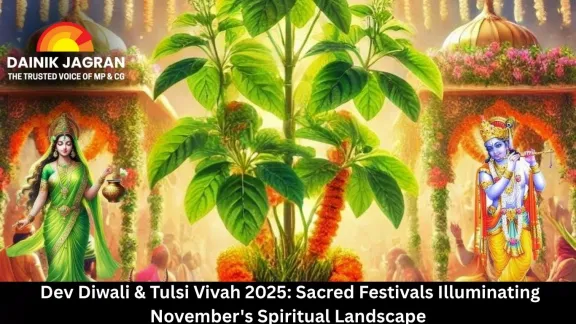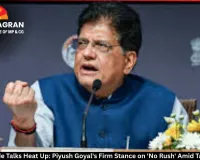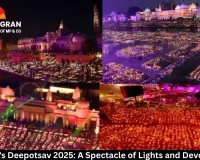Dev Diwali & Tulsi Vivah 2025: Sacred Festivals Illuminating November's Spiritual Landscape
Digital Desk

As the monsoon clouds recede, the Hindu month of Kartik brings two significant celebrations that mark the transition from the rainy season to the festive winter period. This November, experience Dev Diwali on November 5 and Tulsi Vivah beginning November 2, festivals that weave together mythology, devotion, and vibrant traditions across India.
Dev Diwali 2025: When Gods Illuminate the Ghats
Dev Diwali, also known as Dev Deepavali, translates to "the Diwali of the gods." This spectacular festival falls on Kartik Purnima, the full moon night of the Hindu month of Kartik, which occurs on November 5, 2025 . While the traditional Diwali celebrated by humans occurs fifteen days earlier, Dev Diwali is believed to be when deities descend to Earth to bathe in the sacred rivers, particularly along the ghats of Varanasi .
Mythological Significance and Legend
The primary legend behind Dev Diwali commemorates Lord Shiva's victory over the demon Tripurasura . According to Hindu scriptures, Tripurasura had become invincible through boons and threatened both heavenly and earthly realms. On Kartik Purnima, Lord Shiva destroyed the three cities (Tripura) of the demon, restoring cosmic balance. The gods, in gratitude, illuminated the heavens with lamps, a tradition continued on Earth as Dev Diwali .
The festival also holds significance for Jains, who observe it as the day of Lord Mahavira's chief disciple attaining enlightenment, and for Sikhs, who celebrate the birth anniversary of Guru Nanak Dev Ji .
Rituals and Celebrations: A Visual Spectacle
Dev Diwali transforms entire riverfronts, particularly in Varanasi, into breathtaking canvases of light and devotion. The key rituals and celebrations include:
- Kartik Snan: Devotees begin before dawn with a sacred bath in the Ganges, believed to cleanse sins and ensure spiritual merit .
- Lighting of Lamps: The most spectacular aspect involves lighting over two million earthen lamps (diyas) along the ghats of Varanasi, creating a shimmering riverfront of golden light .
- Ganga Aarti: At Dashashwamedh Ghat, priests perform an elaborate 45-minute Ganga Aarti with large brass lamps, conch shells, and synchronized chants before a massive gathering of devotees .
- Tributes to Martyrs: Ceremonies honoring soldiers who sacrificed their lives include guard-of-honor salutes and wreath-laying at specific ghats .
Community Celebrations and Travel Tips
For visitors planning to experience Dev Diwali in Varanasi, several boat options are available—from shared rowboats starting at approximately ₹400 per person to private motorboats ranging from ₹1,500 to ₹5,000 . The evening boat ride offers an unparalleled view of the illuminated ghats and celebrations.
Temple priest Shivendra Sharma explains, "Dev Diwali represents the ultimate triumph of divine light over darkness. When we light those millions of lamps, we're not just recreating the celebration of the gods we're affirming the light within each soul returning to its source" .
Tulsi Vivah 2025: The Divine Union That Begins Wedding Season
Tulsi Vivah, the ceremonial marriage of the sacred Tulsi plant (holy basil) to Lord Vishnu, heralds the beginning of the Hindu wedding season. In 2025, this festival falls on November 2, with celebrations possible until Kartik Purnima (November 5) .
The Mythological Story of Vrinda's Devotion
The origin of Tulsi Vivah traces back to the poignant legend of Vrinda, a devout woman married to the demon-king Jalandhar . Due to Vrinda's unwavering devotion and purity, Jalandhar became invincible, threatening cosmic balance.
Lord Vishnu, to restore order, disguised himself as Jalandhar and approached Vrinda, thus breaking her protective chastity. When Vrinda discovered the deception, she cursed Vishnu would turn to stone (Shaligram). She then immolated herself, and from her ashes emerged the sacred Tulsi plant .
Touched by her devotion, Vishnu blessed Vrinda that she would become worshiped as the holy Tulsi plant and that he would marry her annually as Shaligram .
Rituals and Home Celebrations
Tulsi Vivah transforms households into wedding venues with elaborate rituals:
- Decorating the Bride: The Tulsi plant is cleaned, decorated with a red cloth (sari), jewelry, and vermilion, transforming it into a divine bride .
- Preparing the Groom: Lord Vishnu is represented as the groom through a Shaligram stone or idol, adorned with yellow cloth and garlands .
- Wedding Ceremony: The ritual includes invoking Lord Ganesha, exchanging garlands, circling the sacred fire, and tying the bridal couple together with a sacred thread .
- Prasad Distribution: The ceremony concludes with aarti and distribution of prasad, often including traditional sweets and food .
Spiritual Meaning and Modern Relevance
Tulsi Vivah signifies more than just ritual—it represents the union of the individual soul with the Divine . The festival also marks the end of Chaturmas, the four-month period when auspicious ceremonies are paused, and the beginning of the wedding season in Hindu culture .
Devotee Priya Mehta shares, "Our family has celebrated Tulsi Vivah for three generations. We spend days preparing the decorations, the miniature wedding attire, and the feast. When my grandmother leads the mantras, our entire home transforms into a temple. It reminds us that devotion can turn even a simple plant into the bride of the Divine" .
A Time of Spiritual Transition
These November festivals beautifully illustrate Hinduism's deep connection between nature, mythology, and spiritual practice. As Temple Priest Anand Joshi reflects, "The progression from Tulsi Vivah to Dev Diwali within days mirrors the soul's journey—from personal devotion and union with the divine to cosmic celebration of light's victory over darkness. These festivals remind us that the divine is present in both the sacred plant in our courtyard and the countless lamps illuminating our holiest rivers" .
Whether witnessed in temple gatherings or intimate home ceremonies, Dev Diwali and Tulsi Vivah offer profound opportunities for spiritual renewal as the holiday season approaches.





.jpg)
.jpg)
.jpg)
.jpg)
.jpg)
.jpg)
